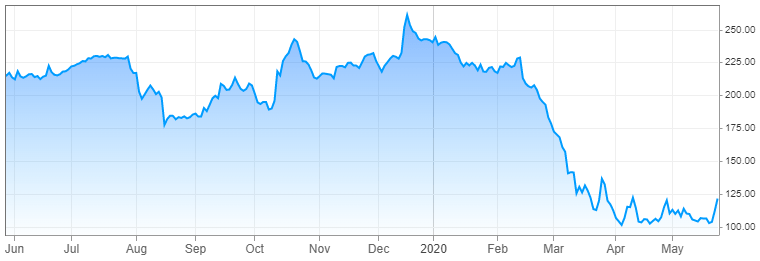RBS Stock Gains 10%, as It Recovers from Recent Selloff

During the Wednesday tradings session, the shares of Royal Bank of Scotland (RBS) have made notable gains and has risen by 10%. Just yesterday, the stock was trading at 112.55p, however today it has risen as far as 123.45p.
The RBS shares performed quite decently during the second half of 2019. During this period the stock has risen from 210p to 250p by the middle of December. At first, it did drop to 175p in August, but in the subsequent months, it regained those losses and reached multi-year highs.

source: cnbc.com
Just like in the case of many other securities, the RBS began to slide after the outbreak of the COVID-19 pandemic. Most of the losses came in February and March 2020, when it dropped all the way down to 101p. The stock mostly moved sideways for the next two months. Consequently, today’s surge is significant, since it can mark the beginning of a larger breakthrough. However, at this stage, it is difficult to predict whether we are dealing with just one isolated move or the start of long term uptrend. Obviously the future performance of the stock will depend upon the financial performance of the bank.
Why Some Investors Are Attracted to RBS Stock?
Recently there was not any major good piece of news with regards to RSB. So this brings an obvious question: what is the cause behind this major move? Well, we can identify several reasons for that:
- Firstly, Price to Earnings analysis suggests that stock is quite undervalued. According to the latest reports, RBS has earnings per share indicator at 22.5p. Consequently, the P/E ratio stands at 5.5. This points to the fact that here we might be dealing with a significant undervaluation. In fact, the price has to rise by more than 350% for the security to cross into the overvalued territory.
- Despite the fact that the UK’s central bank has a near-zero interest rate policy, the net interest margins of RSB are holding out quite well. During the first quarter of 2020, the NIM of the bank stood at 1.89%. During this period the Bank of England did slash the interest rates from 0.75% to 0.1%. For UK banks this has made it even more difficult to maintain decent net interest margins. However, during this period the NIM of RBS only fell by 0.04%. So the bank might be in a good position to benefit from this resilience.
- As long as the UK government owns 60% of the bank, RBS can always count on its financial support. Public officials have vested interest in preserving the solvency of the company. If in the future, the bank faces any serious difficulties, it most likely that the UK government will step in and provide some financial relief. The only alternative option to this would be to let the Bank go down and allow British taxpayers to lose billions of pounds in the process.
All those arguments suggest that RBS is not likely to face solvency problems any time soon. However, it might take several months before the stock price could return back to February levels.


























Comments (0 comment(s))